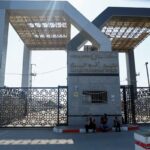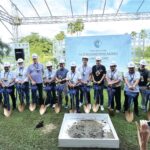PROSPERIDAD, Agusan del Sur (MindaNews / 12 November) – The Upland Sustainable Agriforestry Development (USAD), the centerpiece poverty alleviation program of the provincial government, showcased its best practices in a two-day forum here.
At the closing of the activity on Thursday, representatives from 14 of the 28 provinces in Mindanao endorsed a resolution for the passage of House Bill 3489, or an act establishing the USAD program in upland farms throughout the country.
The proposed law, authored by Rep. Adolph Edward Plaza of the province’s second district and Rep. Alfelito Bascug of the first district, aims to make USAD a national program to alleviate the economic conditions of impoverished farmers living in upland communities in the country.
Plaza said in a press conference that HB 3489 had hurdled the committee level, expressing hopes for Congress to approve it before the end of the year.
“It’s now on second reading. I need to do the necessary legwork with the Committee on Ways and Means, and the Committee on Appropriations,” Plaza said.
The two-day Mindanao forum showcased the best practices of USAD in reducing poverty incidence in Agusan del Sur since 2013 in the aftermath of Typhoon Pablo, which devastated many upland villages in the province.
The resolution passed during the forum noted that upland areas play a crucial role in the country’s environmental sustainability, biodiversity conservation and food security.
It said USAD “represents a comprehensive and forward-thinking initiative designed to address the pressing issues faced by upland communities.”
“This program aims to integrate sustainable agriculture and forestry practices, providing a holistic approach to land management that will not only enhance food production but also promote environmental conservation and rural development,” the resolution said.
Talking on the sidelines of the forum with local journalists, Engr. Jalandoni Pitiilan, assistant provincial agriculturist of Lanao del Norte, said the inputs they learned will be a big help in implementing a similar program in the 12 upland towns of the province’s 22 municipalities.
In his speech, Gov. Santiago Cane, Jr. noted that at least 88 percent of the USAD farmers surveyed by the Agusan del Sur State College of Agriculture and Technology have already graduated from the poverty index. The survey, however, covered only 48.23 percent or 2,935 of the 6,085 USAD farmers in the province.
“We declared war against poverty here in our province. Poverty is our number one enemy and the best weapon to fight against it is farming,” Cane said.
Dr. Efren Isorena, USAD economic adviser who spoke on the Local Poverty Intensity Index (LPII), explained that USAD is a tool to empower poor farmers with the right sustainable farming technology.
He presented the four LPII components, namely material poverty or hunger and deprivation, poverty of the body or poor health, poverty of the mind or ignorance, and psychological poverty or fear.
USAD was recognized in the Galing Pook Awards 2021 as one of the Top 10 Outstanding Local Governance Programs in the country.
This acknowledgment was awarded for its best practices in empowering farmers in hinterland areas to become more productive in a sustainable manner, through the implementation of appropriate technological interventions and by fostering partnerships with stakeholders for development.
Mel Senen Sarmiento, chairman of the Galing Pook Awards and former Interior and Local Government Secretary, said the success of the USAD program “mainly rests on the adaptive leaders of the province” since it was conceived in 2013.
“I am inspired by the kind of leadership you have plus the kind of program that addresses the needs that need to be addressed,” Sarmiento said at the sidelines of the forum.
He cited a study wherein “79.6% of Filipinos only asked for basic necessities like modest shelter, access to transportation, food on the table three times a day, for their children to finish secondary education, good government health program, and peace and order.” (Chris V. Panganiban / MindaNews)



